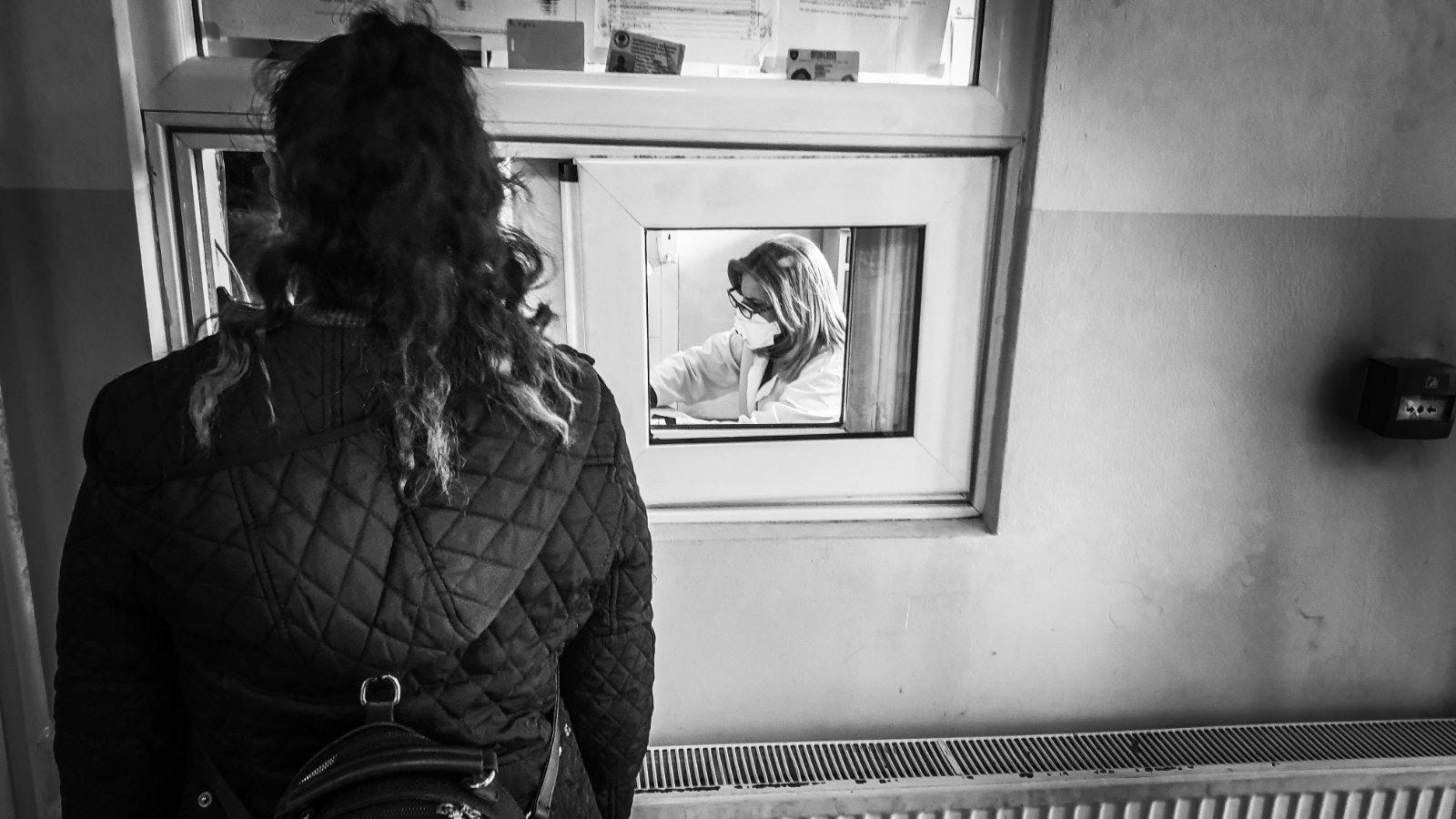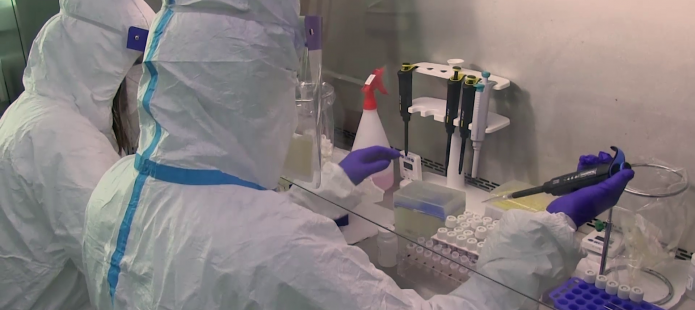With the number of reported cases of coronavirus on the rise, Kosovo’s health sector has been unable to meet the high demand for tests, pushing some citizens with concerns for their health and livelihoods to seek testing in Skopje.
After experiencing an intense cough, a slight headache and fatigue, Arjeta* from Gjilan went to get a checkup at her local medical centre, where a doctor advised her to head to the Infectious Disease Clinic in Prishtina to be tested for coronavirus.
Besides the typical symptoms associated with COVID-19, Arjeta had reason to believe she could have been exposed to the virus, as her husband had contact with an infected colleague. As she also has asthma, she was worried that she was even more at risk.
Arjeta claims that she was refused a test at the Infectious Disease Clinic, who told her that she didn’t have two other common symptoms: fever and high temperature.
“I asked if I needed to have all the symptoms to be positive,” Arjeta tells BIRN, adding that she was advised to return only if the other symptoms appeared.

Clinic of Infectious Disease at the University Clinical Centre of Kosovo. Photo: Fatrion Ibrahimi/BIRN.
Fatmir*, who works in the medical profession, also spoke to BIRN about the difficulties he faced getting tested in Kosovo. He says that he feared losing his business if he was forced to self-isolate for a prolonged period, so chose to be tested in North Macedonia, where he received a negative result for the virus.
Since the number of reported cases of coronavirus shot up rapidly at the beginning of June, the supply of tests available has not risen to match the demand of people requesting to get tested.
Many people, including public officials, have openly criticised the government and public health system for their management of the pandemic as well as for the “chaos with the testing system.”
Rozafa Ukimeraj, General Secretary at the Ministry of Local Government Administration, MLGA, publicly denounced health institutions for “indecent treatment” after she was not tested, despite showing symptoms and having reasonable suspicion that she was infected.
In a statement on Facebook, Ukimeraj announced that she had tested positive for coronavirus from a test conducted at a private health institution in North Macedonia, which opened its shared border with Kosovo on 26 June. “Everyone who I’ve had contact with, please have a medical check-up, since you won’t be contacted by a competent institution,” she pleaded.
BIRN sent questions to the National Institute for Public Health regarding Ukimeraj’s claims that she was mistreated and not provided with a test, but did not receive a response by the time of publication.
In a statement for BIRN, the MLGA said that up until now, Ukimeraj and one other official from the ministry, who was tested in Kosovo, have tested positive for coronavirus. The ministry also expressed its concern that their constant requests to test other members of staff who were in contact with those confirmed as infected have been ignored.
“After the government decision [on 1 July to shut down institutions where cases have been confirmed], we asked the National Institute for Public Health if the MLGA should be shut down. We are still waiting for an answer,” the ministry told BIRN.
The wait is anxiety inducing for Diellor Gashi, an employee of the ministry who was in contact with colleagues that tested positive. He claims to have been bounced between local and central public health institutions, all of whom ultimately refused to test him.
Gashi explains that he went to get a check up with three others from the ministry five days after their colleagues tested positive.
“We had mild symptoms: a headache, a sore throat and nasal congestion,” Gashi says. “First, we went to the Infectious Disease Clinic, where we were advised to go to the National Institute for Public Health. From there, they said we have to go back to the Clinic because they are responsible for testing.”
After being ignored by staff at the Clinic when they returned, Gashi says the group turned to local medical centres, but were told by a medical professional that they didn’t have enough symptoms to be tested for the coronavirus.
“When we asked if we should self-isolate given our contact with our infected colleagues, the doctor said: ‘you don’t have symptoms right now so it’s your call,’” he tells BIRN.
Gashi feels he has been let down by Kosovo’s institutions and that he would rather pay a fee to get tested privately in Skopje.
Following Ukimeraj’s example, Gashi and his colleagues have already booked an appointment at the Acibadem Sistina hospital and are scheduled to be tested on 8 July. He says appointments were mandatory due to the high demand for testing at the clinic, which charges 80 euros for a “full package” of testing.
Acibadem Sistina claims it has the only laboratory in the country capable of performing two different types of coronavirus testing: a rapid serological test and a polymerase chain reaction, PCR, molecular test.
The rapid serological test detects IgG and IgM antibodies, which occur in the body as a result of a previous contact with the SARS-CoV-2 virus. The test is performed by taking a blood sample and costs around 20 euros. The PCR molecular test requires a deep throat and nose swab and detects the presence of SARS-CoV-2 virus. It costs around 64 euros at Acibadem Sistina, while some other laboratories in Skopje also perform PCR tests, including Biotek and Avicenalab.
BIRN asked Acibadem Sistina about the number of patients from Kosovo that have been tested at the hospital, but did not receive a response.
On 5 July, the Macedonian Government stated that over 67,000 tests for coronavirus have been conducted in the country. On the same day, Kosovo’s National Institute for Public Health stated that just over 25,000 tests had been conducted since February.
Testing in Kosovo deemed a luxury with cases on the rise
Back in March when the first cases of coronavirus in Kosovo were registered, a system of chain testing based on symptoms and contact history was developed.
On 24 May, no new cases of coronavirus were recorded for the first time since the first positive results on March 13. Lockdown measures were eased following this news, with most businesses reopening and freedom of movement restrictions removed at the beginning of June.
On 3 June, a new government was formed with Avdullah Hoti as prime minister and Armend Zemaj serving as health minister. On his first day in charge, Hoti spoke of the need to increase testing capacity to include both symptomatic and asymptomatic people.
However, little more than two weeks later, after a drastic rise in numbers of infected citizens, the Ministry of Health passed a new regulation on testing, stipulating that asymptomatic people would not be tested.
“Asymptomatic people will not be tested, but will be advised to undergo a 14 day self- isolation and self-monitoring of their condition. If symptoms arise, they should seek medical help immediately,” states the regulation, which entered into force on 21 June.
But in recent weeks, even symptomatic patients have been complaining that they cannot get tested. Donika Emini, a political analyst, claims to have been ignored by public health institutions concerning her request for a test.
“Not only did I not get tested, but the doctor refused to measure my body temperature, claiming her thermometer was not working,” Emini says, adding that staff told her they were prioritising testing and treatment for those with more severe symptoms than her own.
Emini suffers from bradycardia, a condition that slows the heart rate. She chose to self-isolate but says that nobody has registered her as doing so, and that presently there is no system in place to ensure that those required to self-isolate stay at home or not.
Although she has already finished two weeks of self-imposed quarantine, Emini is still considering getting tested for antibodies (which determines whether the virus was ever in your system) in North Macedonia.
According to the government regulation, one of the reasons that fewer tests are to be conducted is the lack of testing kits available. “With the rise of the cases detected in the last two weeks, and the lifting of movement restrictions for citizens, laboratory capacities for testing every possible contact case are limited,” it states.
On 5 July, the Kosovo Government took a number of decisions to combat the rise of coronavirus cases, including five intended to increase the availability of testing.
The Ministry of Health has been obliged to allocate a budget for the purchase of 100,000 new tests, while the licensing of private health institutions to provide testing is also envisioned, alongside creating new testing capacities in the region. The government also called for the “full utilisation of existing testing capacities” and the “prioritisation of the most needy.”
However, until the effects of these policies bear fruit, the almost impossible route to getting tested in Kosovo is pushing more and more patients toward finding a solution in North Macedonia.
Arjeta, who still has not been tested, claims that even during an economic crisis, she would rather pay a fee than endure an anxious wait for a test, fearing for her health and that of her most vulnerable family members.
Illustration: Jete Dobranja for Prishtina Insight.
*Names changed at the request of the interviewees







